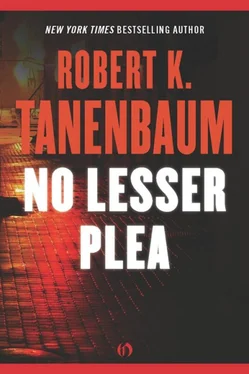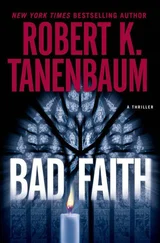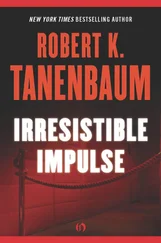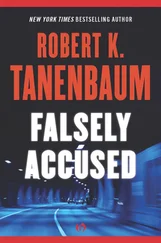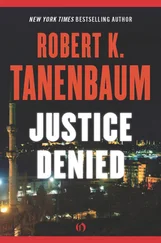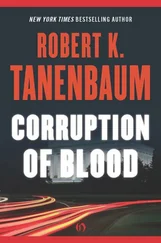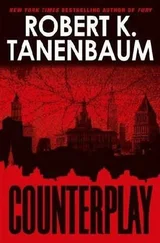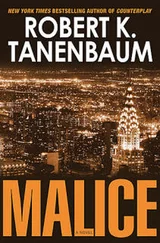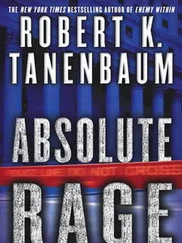Robert Tanenbaum - No Lesser Plea
Здесь есть возможность читать онлайн «Robert Tanenbaum - No Lesser Plea» весь текст электронной книги совершенно бесплатно (целиком полную версию без сокращений). В некоторых случаях можно слушать аудио, скачать через торрент в формате fb2 и присутствует краткое содержание. Год выпуска: 2011, ISBN: 2011, Издательство: Open Road Integrated Media, Жанр: Криминальный детектив, на английском языке. Описание произведения, (предисловие) а так же отзывы посетителей доступны на портале библиотеки ЛибКат.
- Название:No Lesser Plea
- Автор:
- Издательство:Open Road Integrated Media
- Жанр:
- Год:2011
- ISBN:978-1-4532-0994-3
- Рейтинг книги:4 / 5. Голосов: 1
-
Избранное:Добавить в избранное
- Отзывы:
-
Ваша оценка:
- 80
- 1
- 2
- 3
- 4
- 5
No Lesser Plea: краткое содержание, описание и аннотация
Предлагаем к чтению аннотацию, описание, краткое содержание или предисловие (зависит от того, что написал сам автор книги «No Lesser Plea»). Если вы не нашли необходимую информацию о книге — напишите в комментариях, мы постараемся отыскать её.
No Lesser Plea — читать онлайн бесплатно полную книгу (весь текст) целиком
Ниже представлен текст книги, разбитый по страницам. Система сохранения места последней прочитанной страницы, позволяет с удобством читать онлайн бесплатно книгу «No Lesser Plea», без необходимости каждый раз заново искать на чём Вы остановились. Поставьте закладку, и сможете в любой момент перейти на страницу, на которой закончили чтение.
Интервал:
Закладка:
“Then we’re fucked. For that matter, he could have split town. But, I figure Louis for somebody who’s got to control everything. Look at how successful he’s been. You think he’s going to pick a sidekick who’s going to split, who has any real options. No, we’re looking for a local mutt, Sonny. Just a regular anonymous local mutt. Look, let’s check the parole records. He’s a first offender, he had to make parole, right. One of these guys ever did straight time it’d make headlines.”
Dunbar looked skeptical. “This is another long shot, Butch.”
“Shit, Sonny, a long shot is the only shot we got. And I was right once, wasn’t I?”
Dunbar sighed. “I’ll check it out,” he said.
Number 563 Boynton Street was one of three apartment houses on the block still occupied by human beings. The name of the building, graven in a marble lintel, was Lancaster. In its better days it had sheltered a generation of Irish, then a generation of Jews. The other buildings had been torched by vandals, or by their owners for insurance. Some of these had their windows blocked with glittering tin sheets. Others had been demolished and turned into fields of gray and red lumps, from which sprang jungles of hardy weeds. The streets sparkled with crushed glass.
So many buildings had been cleared that Dunbar, climbing out of his dusty white Chevy, once again had the odd impression he often got in this part of the Bronx, of not being in the city anymore, but out west, among the classic landscapes of the horse opera. In the vacant plains of flattened rubble, the buildings stood like weathered buttes. It was one of the few parts of New York where you could see almost the whole dome of the sky from street level. It always gave Dunbar the shivers.
Karp had been right. There was an armed robber who had been released from Attica at just the right time. And who looked right. And who had the right name. Dunbar patted his gun, unconsciously, and entered the fetid hallway of 563, heading for Apartment 505, the last known address of Preston Elvis.
Dunbar was about to ask the girl who opened the door if her momma or daddy was home, until he saw her swelling belly and the little boy who clung to her pink housecoat. This thin child was the lady of the house. He flashed his shield.
“Police. Are you Mrs. Elvis?”
“What you want? I ain’t done nothin’.”
“Could I come in?”
Silently, she backed away from the doorway. Mother and child stared at him with liquid, sad brown eyes. The living room was the same as all the others he had been in. A lumpy couch-this one was green plastic-and a big color TV. A game show was blaring: a capering man was giving things away to white people.
“That’s a nice new TV, there,” said Dunbar. “Preston got that for you, did he?”
“Who?”
“Preston Elvis. This guy,” said Dunbar, showing the mug shot. “He lives here, right?”
“No, nobody live here, jus us.”
“But, he comes here a lot, doesn’t he? I mean I could find out lots of ways, but it’s easier if you tell me. And, shit, honey, I ain’t from welfare. I don’t give a rat’s ass who lives here or when. I just need to talk to him.”
“He ain’t been ’round for a long while,” she said, sullenly.
Dunbar looked through the apartment. There was a pair of men’s shoes near the couch. The bedroom and bathroom were empty, but there were male clothes scattered around and in the closet, and there were recently used shaving things in the bathroom.
He went back to the woman. The boy had returned to watching TV.
“What’s your name, girl?”
“Vera. Higgs.”
“OK, Vera. I’ll tell you the truth, now. I don’t want to take you downtown. I don’t want to take your little boy away. And I definitely don’t want to tell the welfare that a man’s been living here. OK? But all that is gonna come down, if I don’t get to talk with Preston real soon? So tell me, where’s he at?”
“He workin’. He ain’t done nothin’.”
“Right, and where does he work?”
“I don know. He never tell me shit about what he be up to. Someplace, down in the city. No lie, Mister, I don know.” Her voice became shrill and tears started.
Dunbar believed her. He thought, OK, Sherlock, time to play detective. What he didn’t want was to have to stake out this shithole, maybe for hours or days even, if Elvis decided not to come home for a while. He looked more closely at the miserable dwelling, opening drawers, peering into cabinets, willing something to pop out at him. There was a pile of newspapers on the kitchen table. Idly, Dunbar picked one up and glanced at the headline, something about black leaders selling out their third-world brothers in the struggle against imperialism. Late-breaking news. Then something clicked.
He showed the paper to the woman. “Who reads this paper, you?”
She shrugged. “He bring them here.”
“He ever talk about a dude name of Mandeville Louis? Or Stack?” Shrug. Dunbar said, “I’ll be back.” He left the apartment and rushed down the stairs. It could be a coincidence that Preston Elvis had lying around his apartment twenty or thirty copies of the Claremont Press, the same newspaper that Mandeville Louis had worked for. But somehow Dunbar doubted it.
“Mister Barlow? Emerson Dunbar,” said Dunbar, showing his ID. “I’d like to ask you some questions.”
The editorial offices of the Claremont Press occupied a storefront on the avenue of the same name, and consisted of a small shop immediately off the street, where you could buy the Press and a selection of books and records, or place classified ads; and, behind a glass door, one large room, which held a jumble of battered desks, filing cabinets, and other necessaries of journalism. Dunbar was standing at one of these desks, talking to James Barlow, the managing editor of the Claremont Press.
Barlow, a chubby, tan man with an Afro and ferocious side whiskers was dressed in a bush jacket and a black T-shirt. He regarded the police ID with studied repugnance.
“Why don’t you pigs leave us alone? The fucking FBI was here last week. I’m being followed, you know that? Two little blondies in a gray car. You see this phone? Tapped. The entire power of the fascist racist state is ranged against us, but we shall continue to speak and print the truth. Now, beat it! Go fuck with the Times for a change.”
“Mister Barlow, I’m not trying to harass you. This is a routine investigation of a routine crime. All I want to know is, have you seen this man?” He held out the mug shot of Preston Elvis. Barlow barely glanced at it.
“No,” he snapped.
“You sure? Why don’t you take another look? We have reason to believe he worked here.”
“I don’t need to. One oppressed nigger is the same as another. And if you think I’m going to help an oreo pig track down a brother, you’re dumber than you look.”
“Take it easy, Barlow. I gave fifty bucks to the NAACP in 1969.”
“Get out of here!”
“Honest, Barlow, I could care less about this guy’s politics. And they promised me if I broke this case I’d make sergeant-don’t you want to see the brothers get ahead on the force?”
“Brother, my ass! When the oppressed peoples rise up it’ll be class traitors and running dogs like you who’re gonna go to the wall first.”
“I can hardly wait. Lookie here, Lumumba, I’d like to stay and bullshit with you about the class struggle and all, but there’s this guy who seems to have aced about a hundred guys, most of ’em blacker than you, and I’d like to put him away, and this dude Elvis is gonna help me do it. Now, I asked you nice to help me, and you told me to get fucked so what do you say, we go along downtown and I’ll ask you again?”
Читать дальшеИнтервал:
Закладка:
Похожие книги на «No Lesser Plea»
Представляем Вашему вниманию похожие книги на «No Lesser Plea» списком для выбора. Мы отобрали схожую по названию и смыслу литературу в надежде предоставить читателям больше вариантов отыскать новые, интересные, ещё непрочитанные произведения.
Обсуждение, отзывы о книге «No Lesser Plea» и просто собственные мнения читателей. Оставьте ваши комментарии, напишите, что Вы думаете о произведении, его смысле или главных героях. Укажите что конкретно понравилось, а что нет, и почему Вы так считаете.
